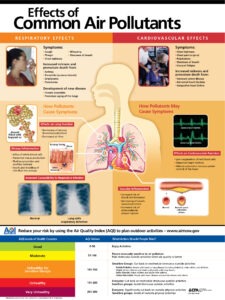A Charlotte region air-quality expert spoke at our March BPC meeting, just as we entered ozone season! Ivonne Hernandez, Air Awareness Coordinator in Mecklenburg County’s Land Use and Environmental Services Agency, discussed the science behind air quality, the impact of pollutants on our bodies, and how we can protect our health.
The Science behind Air Quality
Our region has two main air pollutants: 1) ozone and 2) particulates.
- Ozone is bad from March through October given the heat and longer days. Ozone is a photochemical reaction needing sunlight, nitrogen oxides (e.g., from cars, asphalt and concrete plants) and volatile organic compounds (e.g., pine needles).
- Particulates are anything that hangs in the air.
The Impact on the Body
What happens when these pollutants enter our bodies?
- Ozone affects our lungs by narrowing and inflaming the airways, decreasing air flow, and increasing susceptibility to respiratory infection. Bodies can heal, but there is a long-term impact. People with pre-existing respiratory conditions (e.g., asthma and respiratory issues), older adults, people who are active outdoors, and children are sensitive to ozone. On a bad air-quality day you may cough, be short of breath, or feel chest tightness.
- Because particulates up to 2.5 micrometers in diameter are too small for our lungs to block, it impacts the lungs, enters the bloodstream, and impacts the heart (i.e., is cardiovascular). Preliminary findings show that particulate matter may impact the brain but research is continuing.

How to Protect Your Health
Ms. Hernandez suggests that people with sensitivities pay particular attention to “action days for ozone.” Download the EPA tool, the AirNow App from www.airnow.gov. It shows the day’s Air Quality Index. Learn the code! Hint: green – go – good; and red – stop – bad. On bad days, limit your exposure. Slow your breathing rate: walk, don’t run! Exercise in the mornings or at night, not mid-day.

She also recommended reviewing the Mecklenburg County Air Quality Data Page and noted that the closest monitoring station in our area is the Catawba Indian Nation.
How to Protect Our Community’s Health

In the Charlotte region, cars are the primary polluter, with over 1MM cars on the road. They contribute to “on-road mobile sources” (41%). Other pollutants are “point sources” such as power plants and other industry (29%); “non-road mobile sources” such as back hoes and excavators (21%); and “area sources” including leaf and trash burning (9%).
We can help by carpooling, biking, or taking public transit. “Go electric” with vehicles and lawn equipment; plan ahead and combine trips; practice energy efficiency at home by using efficient appliances; avoid idling and skip the drive thru; never burn trash. The impact of blowing leaves with gas equipment equals driving 1,100 hours in a car! Turn your car off when waiting, as idling pollutes more than turning car off and on; plus with gas prices on the rise it’s a good way to economize.

Why the BPC Cares
The BPC already understands the importance of creating a safer space for people to bike and walk. Ms. Hernandez reminds us that having zero casualties would motivate people – cycling is good for both health and air quality!
Other Items of Interest to the Group

Meeting participants shared the below resources:
- American Trails introduction to trail assessment using Universal Trail Assessment Process and High Efficient Trail Assessment
- Piedmont Trails Summit
- March 25, 2022, Live Healthy York County data walk
- Federal Reserve’s Investing in Rural America conference
- Clinton ConNEXTion Community Forum and Update, March 22, 6-8pm, McGirt Auditorium at Emmett Scott Center
- Mental Health First Aid courses
About our speaker: Ivonne Hernandez is one of two Air Awareness Coordinators in Mecklenburg County’s Land Use and Environmental Services Agency. Her role covers the Charlotte region which includes Mecklenburg and surrounding counties including York, Lancaster, Cabarrus, Iredell, Gaston; based in Mecklenburg County. She’s an avid hiker who loves being immersed in nature and spending time with her husband and pets. Her family is originally from Guatemala making her bilingual in English and Spanish. Don’t hesitate to reach out to her to hear what other free resources she has available or schedule your own AQ101 presentation.

BPC welcomed Ivonne Hernandez to our March 2022 meeting


